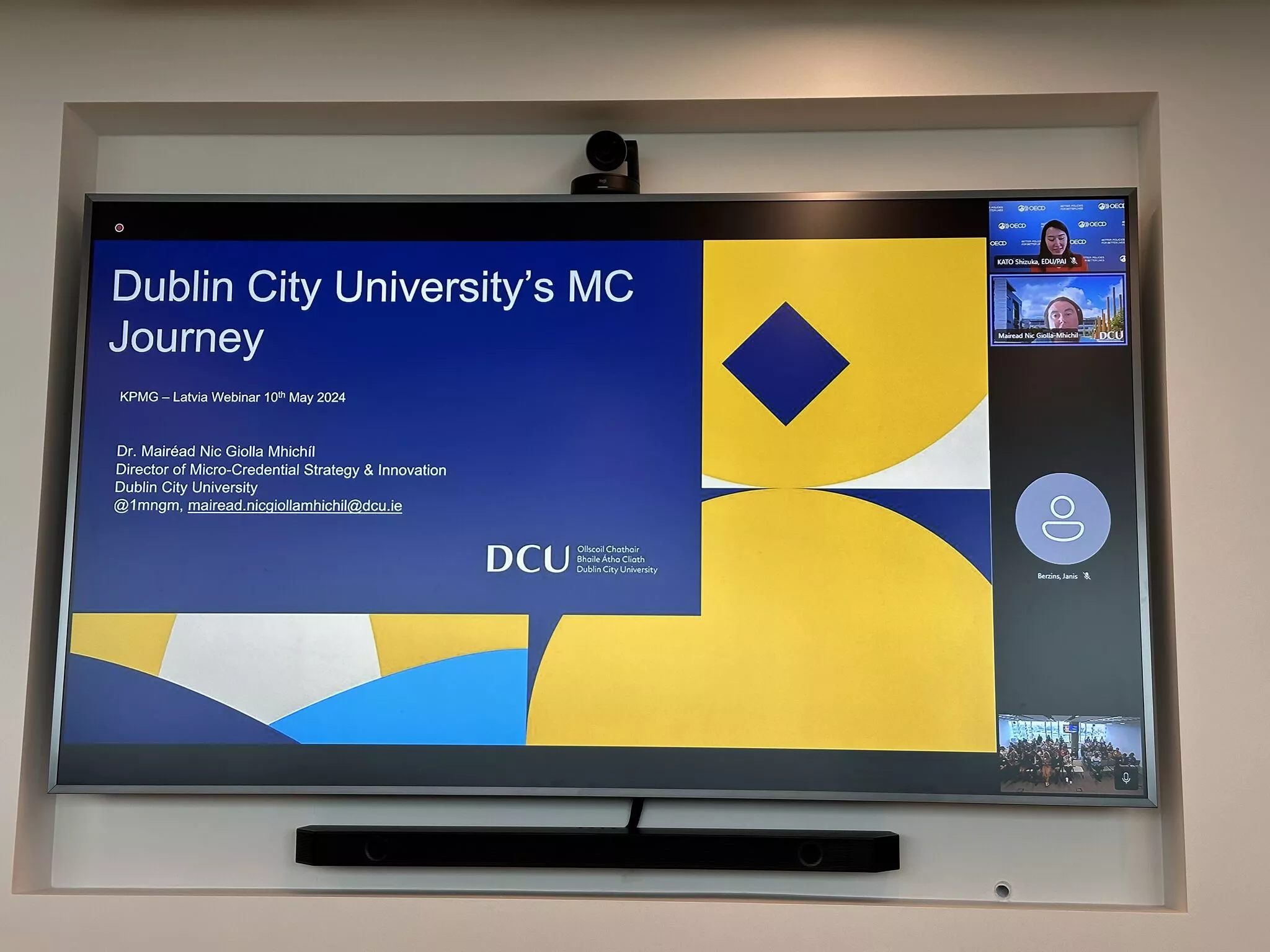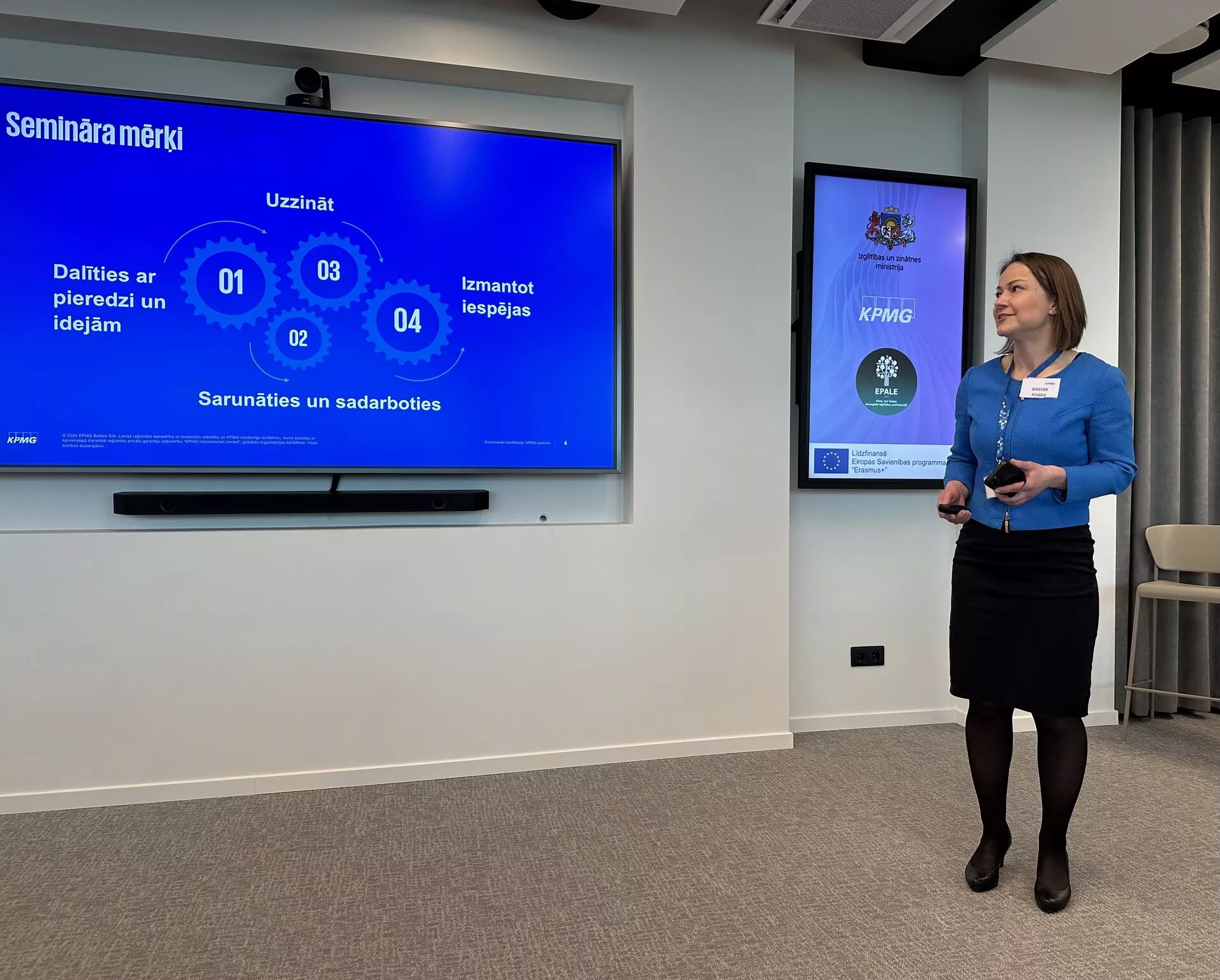Unlocking the Potential of Micro-Credentials: Takeaways from a Seminar
The wave of micro-credentials in the international higher education landscape continues to shape and redefine the sector. When the Ministry of Education and Science (MoES) announced the initiation of a pilot project in Latvia, I knew it was the perfect time to gather with stakeholders and exchange updates on the latest developments. With the support of EPALE project, the team of the MoES of Latvia, and my colleagues at KPMG, a great seminar was born.
Context
- A common European approach to micro-credentials and a Recommendation on a European approach to micro-credentials for lifelong learning and employability including its 10 principles for micro-credential development, is well known in HE community by this time. However, one might forget that the Recommendation aims to SUPPORT the development, implementation, and recognition of micro-credentials across institutions, businesses, sectors, and borders. Without overregulating. Or necessarily creating something completely new and different from existing practices.
- A research by Academic Information Centre[1] of 14 country experience shows that challenges and opportunities they face are similar. There is high motivation to implement micro-credentials, a high demand for flexible learning paths, and a high level of support. However, there is also a lack of understanding on how to define them and ensure quality, as well as a lack of practical support mechanisms. Additionally, variety of national approaches may affect the recognition of micro-credentials.
- If we delve deeper into the 10 principles as outlined in the Recommendation, we can see that a large part of the existing adult education offered by universities in Latvia already complies, or could comply with some adjustments, to what we understand as a "micro-credential" at the EU level.[2].
A pilot project in Latvia is underway
- The overall HE policy in Latvia aims to move away from an input-based funding system towards an institutional, result-based funding system. The proportion of result-based funding for HE is gradually increasing, and it is planned that the contribution of HEIs to adult education will be considered as one of the result indicators for result-based funding.
- Initially, the funding designated for this goal will be used for a pilot project, which will be coordinated by a university of applied sciences, namely Vidzeme University of Applied Sciences. The goal of the pilot project is to elaborate and promote micro-credentials and to develop recommendations for the system and regulation.
What can we learn from OECD and Dublin City University?
I would like to highlight some useful insights shared by the excellent OEDC expert Shizuka Kato, based on recent OECD research[3]. So grateful she made it while the rest of France was on holiday!
- How micro-credentials are distinct from long-established continuing education programs? Firstly, they are labor market-oriented and respond to short, medium, and long-term skills needs. Secondly, they are often offered online or in a hybrid format to ensure flexibility. Thirdly, although they can be taken on their own, they should be recognized and, when appropriate, used towards obtaining a larger qualification. Lastly, they are cross-sectoral and could be offered across higher education, vocational education and training, and adult learning providers. They are often co-created with actors from the broader socio-economic environment.
- How are governments responding to micro-credential development? In different ways. Some are taking harder approaches by issuing decrees or amending legislation, such as Spain. Others are taking softer approaches by issuing non-binding guidelines, such as Australia, Canada, New Zealand, or Ireland. Both approaches are acceptable
- How can public policies help micro-credential providers and learners? Examples of policy levers used in OECD countries provides some useful pointers:
Shizuka also provided great examples of using funding schemes for HEIs and learners:
- The Netherlands, for instance, has a a micro-credential pilot in the HE sector ran from 2021 to 2023, and the pilot in the VET sector started in 2024[4].
- Finland’s core funding allocation model for HEIs considers the number of credits gained through open studies from 2021 (5% for universities and 9% for universities of applied sciences)[5].
- England plans to extend its income-contingent loan scheme for degree programmes to smaller units of learning, such as modules, starting in 2025.
- Since 2015, Singapore has provided all citizens aged 25 and above with a credit of SGD 500 as part of the MySkillsFuture initiative.
Additionally, providing information on micro-credentials is crucial, and portals launched by the German Rectors Conference[6] and the Irish Universities Association[7] offer great support in this regard.
And Mairéad Nic Giolla Mhichíl, who is the Director of Micro-Credential Strategy & Innovation at the Dublin City University, provided us with a great dose of energy and a "just do it" attitude. Her practical advice to universities includes being clear on institutional drivers and objectives, differentiating clearly between micro-credentials for higher education and those focused on a slim definition of skills, focusing on areas of strength and alignment, contemplating unbundling and value proposition to the learner, being realistic about revenue streams, and clarifying engagement and co-construction with industry and stakeholders.
Key issues raised by universities
Iveta Putniņa from Vidzeme University of Applied Sciences, Elīna Gaile-Sarkane from Riga Technical University, Inese Kokina from Daugavpils University and Dace Lāce from University of Latvia raised important issues to consider.
Navigating regulations and frameworks
- Universities and adults already find it challenging to navigate current adult education regulations, and the micro-credential framework should enhance existing systems rather than create new types of learning.
- For example, the existing quality assurance frameworks for higher education should be used for micro-credentials by HEIs.
- Participation in international university alliances, such as E³UDRES² (Vidzeme University of Applied Sciences) and Forthem Alliance (University of Latvia), provides paramount experience on how to develop international offerings and ensure their stackability.
- A national framework or guidelines for micro-credentials are needed to provide a logical starting point.
- The framework should allow for the flexibility that learners seek and support the recognition of micro-credentials. A successful pilot project should result in fewer questions and more clarity on micro-credentials, and set a more precise goal.
Development and provisions of micro credentials
- The development and provision of micro-credentials should be a focus for universities in areas where they have study and research capacity, with the goal of supporting adults for upskilling and reskilling for the labor market.
- The ability to develop micro-credential programs in a short period of time is crucial to respond to the fast-changing labor market.
- The competitive advantage of universities in Latvia compared to international fully online courses is the provision of a social component of learning, including interaction with teachers and other learners.
- Involving practitioners alongside university lecturers enhances the relevance and applicability of micro-credentials to current market needs (LU). And it is important to recognize that adults learn differently from young students.
I hope this seminar provided some inspiration for action, opportunities to exchange with experience and opinions. The only drawback - lack of time to hear the experiences of also other universities. But there will be more opportunities.
Very grateful also to other speakers who made this event exceptionally content-rich, setting a valuable foundation for future progress: Evija Šturca, KPMG; Baiba Ramiņa, Academic Information Centre; Diāna Laipniece, Ministry of Education and Science; Shizuka Kato, OECD; Mairéad Nic Giolla Mhichíl, Dublin City University, and Kristaps Kovaļevskis, KPMG, for moderating.




[1] Tecilazić, A., Ramiņa, B., Kinta, G., Zvirbule-Jankova, L. (2023). Recommendations and Guidelines on Micro-Credentials. https://aic.lv/content/files/QUATRA-TPGA_recommendations-on-micro-credentials_09.11.2023.pdf
[2] An analysis from 2021 could be found in Līce, A. (2021). Micro-credentials in Latvia. https://nki-latvija.lv/storage/resources/report_micro-credentials-in-latvia_2021.pdf
[3] OECD. (2023). Public policies for effective micro-credential learning. https://doi.org/10.1787/a41f148b-en and OECD. (2023). Micro-credential policy implementation in Finland, the Slovak Republic, Slovenia and Spain. https://doi.org/10.1787/c3daa488-en
[6] Portal available at https://hoch-und-weit.de/
[7] Portal available at https://microcreds.ie/






The seminar on micro…
The seminar on micro-credentials, organized by the Ministry of Education and Science of Latvia and supported by EPALE, highlighted the development and implementation of micro-credentials in higher education. The seminar emphasized the European approach to micro-credentials, aiming to support their development, implementation, and recognition without overregulation. A pilot project in Latvia, led by Vidzeme University of Applied Sciences, seeks to promote micro-credentials and develop regulatory recommendations. OECD expert Shizuka Kato provided insights into how micro-credentials differ from traditional continuing education programs by being labor market-oriented, flexible, and often co-created with socio-economic actors. Governmental responses vary, with some countries issuing strict regulations and others offering guidelines. The seminar acknowledged high demand and motivation for micro-credentials, despite challenges in quality assurance and recognition.